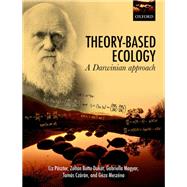
Theory-Based Ecology A Darwinian approach
by Pasztor, Liz; Botta-Dukat, Zoltan; Magyar, Gabriella; Czaran, Tamas; Meszena, GezaBuy New
Rent Textbook
Rent Digital
Used Textbook
We're Sorry
Sold Out
How Marketplace Works:
- This item is offered by an independent seller and not shipped from our warehouse
- Item details like edition and cover design may differ from our description; see seller's comments before ordering.
- Sellers much confirm and ship within two business days; otherwise, the order will be cancelled and refunded.
- Marketplace purchases cannot be returned to eCampus.com. Contact the seller directly for inquiries; if no response within two days, contact customer service.
- Additional shipping costs apply to Marketplace purchases. Review shipping costs at checkout.
Author Biography
Liz Pasztor, Department of Genetics, Eotvos University,Zoltan Botta-Dukat, MTA Centre for Ecological Research,Gabriella Magyar, Formerly of Department of Plant Systematics, Ecology and Theoretical Biology, Eotvos University,Tamas Czaran, Research Group of Theoretical Biology and Evolutionary Ecology, MTA and Eotvos University, and Niels Bohr Institute, University of Copenhagen,Geza Meszena, Department of Biological Physics, Eotvos University
Liz Pasztor is an evolutionary ecologist with broad interests in understanding the structure of ecology and evolutionary biology. She had graduated in biology and philosophy at Eotvos University (Budapest) where she got her PhD in 1997 and habilitated in 2010. She has been giving lectures and held seminars in population biology, evolutionary biology, biostatistics and evolutionary ecology since 1982. She has contributed to the theory of life-history evolution by developing density-dependent optimisation models for the understanding of geographical variation of clutch-size and fecundity and run experimental studies on parental care of great tits observed by automated weighing their nest-boxes. She is a co-editor and author of a general ecology textbook for BSc students (in Hungarian).
Zoltan Botta-Dukat has taken MSc degree in Agrochemistry and in Nature conservation, followed by a PhD in Botany. His research focused on phytosociology, community ecology and invasion biology. Recently he is a Senior Researcher at the MTA Centre for Ecological Research. His current research topic is investigating the trait-based rules of community assembly. He is Editor-in-Chief of Acta Botanica Hungarica and associate editor of the Journal of Vegetation Science.
Tamas Czaran had studied biology at Eotvos University, Budapest, where he graduated in 1984 and got his PhD in 1991. He started his career as a theoretical ecologist mainly interested in spatially explicit population dynamical modelling, with his field of research later extended to evolutionary biology. At present the main fields of his interest are modelling microbial ecology and evolution, origin of life studies related to the RNA-World concept of prebiotic evolution, and modelling the prehistoric coevolution of human cooperation and language.
Gabriella Magyar graduated from the Eotvos Lorand University, Budapest and made her Ph.D in plant ecological modelling at the same University. As a part of her Ph.D she had a scholarship at the Radboud University Nijmegen doing modelling for the department of Experimental Plant Ecology. She is especially interested in the effects of spatiality and finiteness on population patterns.
Geza Meszena graduated with a degree in Physics, followed by a PhD in Biophysics. Currently is Associated Professor at the Department of Biological Physics, Eotvos University and works on theoretical ecology and evolution. He contributed to the development of adaptive dynamics theory. His current interest is coexistence/niche theory and theory of speciation.
Table of Contents
Part I Introduction
1. Introduction: Darwinian ecology
2. Sources and treatment of complexity
Part II Exponential growth
3. Exponential growth of unstructured populations
4. Population structure and exponential growth
5. Ecological tolerance and the distribution of species
Part III Regulation of population growth
6. Growth regulation, feedbacks and their dynamical consequences
7. Competitive exclusion
8. Tradeoffs and adaptations
9. Robust coexistence and population regulation
10. Population regulation and the ecological niche
Part IV Finiteness and diversity
11. Stochasticity due to finiteness
12. Diversity patterns and population regulation
An electronic version of this book is available through VitalSource.
This book is viewable on PC, Mac, iPhone, iPad, iPod Touch, and most smartphones.
By purchasing, you will be able to view this book online, as well as download it, for the chosen number of days.
Digital License
You are licensing a digital product for a set duration. Durations are set forth in the product description, with "Lifetime" typically meaning five (5) years of online access and permanent download to a supported device. All licenses are non-transferable.
More details can be found here.
A downloadable version of this book is available through the eCampus Reader or compatible Adobe readers.
Applications are available on iOS, Android, PC, Mac, and Windows Mobile platforms.
Please view the compatibility matrix prior to purchase.
